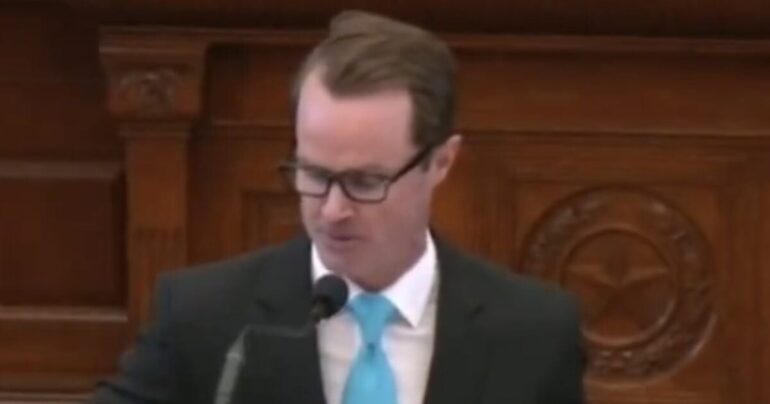🔴 Website 👉 https://u-s-news.com/
Telegram 👉 https://t.me/usnewscom_channel
Free speech advocates criticized the Texas House of Representatives for approving legislation that reportedly requires a government-approved disclaimer for altered political media, including memes, videos, or audio recordings.
HB 366 reads:
A person may not, with the intent to influence an election, knowingly cause to be published, distributed, or broadcast political advertising that includes an image, audio recording, or video recording of an officeholder ’s or candidate ’s appearance, speech, or conduct that did not occur in reality, including an image, audio recording, or video recording that has been altered using generative artificial intelligence technology, unless the political advertising includes a disclosure from the person or another person on whose behalf the political advertising is published, distributed, or broadcast indicating that the image, audio recording, or video recording did not occur in reality.
WATCH:
🚨BREAKING🚨The Texas House passed a bill to CRIMINALIZE POLITICAL MEMES. House Bill 366 would LOCK UP ANYONE FOR A YEAR unless political memes or altered media have a gov disclaimer. Why is TEXAS DOING THIS?!
RINOS are destroying the state!
Follow: @Carlos__Turcios pic.twitter.com/hWQWoe4tlH
— Carlos Turcios (@Carlos__Turcios) April 29, 2025
“The commission by rule shall prescribe the form of the disclosure required by Subsection (b), including the font, size, and color of the disclosure. The commission shall ensure that the form of the disclosure is consistent with other required disclosures on political advertising,” the bill reads.
“A person commits an offense if the person violates this section. An offense under this section is a Class A misdemeanor,” it continues.
The House just passed Dade Phelan’s meme regulation bill in about 30 seconds with no debate. No questions asked. #txlege https://t.co/KJky3fkng9
— Brandon Waltens (@bwaltens) April 29, 2025
Per Texas Scorecard:
The Texas House has approved legislation by former Speaker Dade Phelan that would criminalize the distribution of altered political media, such as memes, videos, or audio recordings, unless they contain a government-mandated disclaimer.
Despite tweaks in a recently adopted committee substitute, the bill continues to face intense criticism from First Amendment advocates who warn it would chill political speech and satire.
Originally pitched as a response to AI-generated “deepfakes” in campaign content, House Bill 366 is significantly broader in scope. The current version makes clear that it doesn’t just apply to artificial intelligence, but also to any image, audio, or video that “did not occur in reality”—a definition that includes basic Photoshop edits and parody.
Under the substitute, the bill now technically applies only to individuals or entities who fall into one of three categories:
* Officeholders, candidates, or political committees;
* Those who spend more than $100 on political advertising during a reporting period (excluding basic tech costs);
* Anyone who publishes or distributes such content for compensation.But critics argue that these limits are vague and still far too broad. The $100 threshold is especially unclear. It’s not defined by platform or content type, raising questions about whether someone who pays for a boosted meme or designs political content using paid tools could be swept up under the law.
🚨TEXAS LEGISLATORS PASS BILL CRIMINALIZING POLITICAL MEMES🚨
HB366, led by Phelan, could jail you for sharing political memes. It mandates disclosures for “altered media” in campaign ads, but its vague wording may criminalize satire and memes.
Free speech under threat?… pic.twitter.com/pNAzhwEFrJ
— Merissa Hansen (@merissahansen17) April 30, 2025
“Wow. What the h*** is going on in Texas? The RINOS are destroying Texas, banning free speech, promoting Islam, and blocking GOP legislation! Perhaps it’s time for President Trump to intervene and speak out about this INSANITY in Texas where the GOP controls the legislature,” investigative journalist Laura Loomer commented.
Wow. What the hell is going on in Texas?
The RINOS are destroying Texas, banning free speech, promoting Islam, and blocking GOP legislation!
Perhaps it’s time for President Trump to intervene and speak out about this INSANITY in Texas where the GOP controls the legislature.… https://t.co/itpyyQwVdN
— Laura Loomer (@LauraLoomer) April 30, 2025
From The Texas Tribune:
Former House Speaker Dade Phelan — who endured a barrage of political attacks last year during his reelection and speaker campaigns— said he authored the legislation to ensure voters understand when materials used in ads had been faked, as the use of generative artificial intelligence makes it easier to manipulate media that could use falsely represent a candidate’s conduct or speech.
“This is the beginning of a new era in ethics where the voters need to know what is real and what is not,” the Beaumont Republican said on the House floor. “This AI technology gets better every single day. It gets more inexpensive every single day, it’s going to become the norm.”
The bill would require the disclosure by officeholders, candidates or political committees who used altered media in ads and spend more than $100 for political advertising. It would task the Texas Ethics Commission with determining what the disclosure would look like, including font, size and color. Violators would be charged with a Class A misdemeanor.
The bill faced fierce opposition from hardline conservatives who say it is policing speech and could allow the state to jail people over silly political memes.
“We have an electorate that is informed and we already have platforms where people can talk,” said Rep. Andy Hopper, R-Decatur. “It is not the role of government to sit there and be a nanny state police force to decide.”
The bill passed out of the House with a vote of 102-40. It now heads to the Senate.
Phelan amended the bill to ensure an individual wouldn’t be punished for altering superficial qualities of an image or video, such as the brightness, contrast or color. The legislation excludes companies, radio or TV broadcasters, commercial sign owners, computer services, and internet providers from liability.
Read HB 366 HERE.

